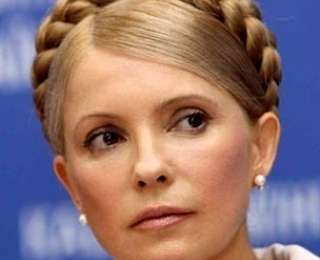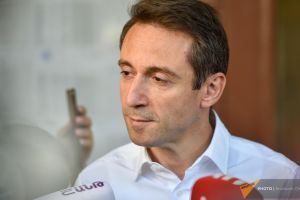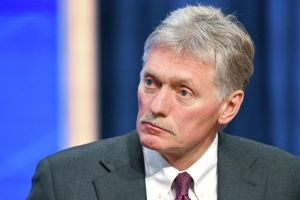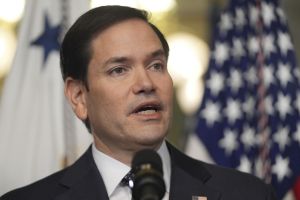
 В британских банках обнаружены миллионные счета Тимошенко и ее семьи, - СМИ. В ведущих британских банков обнаружены 85 счетов, которые могут быть связаны с экс-премьером Юлией Тимошенко и ее семьей. Об этом сообщает британское издание , ссылаясь на отчет в рамках расследования, которое проводит лондонская юридическая компания Lawrence Graham, и который оказался в распоряжении издания. В рамках расследования были проверены 278 счетов по всему миру, 13 из них – до сих пор открыты. На одном из лондонских счетов, открытом на имя "Единых энергетических систем Украины" (ЕЭСУ), обнаружены 40 млн. фунтов. Тут же издание приводит утверждение американского прокурора Марты Берш о том, что уже есть доказательства того, что подконтрольные Тимошенко компании участвовали в схемах по переводу средств на счета экс-премьера Украины Павла Лазаренко.
В британских банках обнаружены миллионные счета Тимошенко и ее семьи, - СМИ. В ведущих британских банков обнаружены 85 счетов, которые могут быть связаны с экс-премьером Юлией Тимошенко и ее семьей. Об этом сообщает британское издание , ссылаясь на отчет в рамках расследования, которое проводит лондонская юридическая компания Lawrence Graham, и который оказался в распоряжении издания. В рамках расследования были проверены 278 счетов по всему миру, 13 из них – до сих пор открыты. На одном из лондонских счетов, открытом на имя "Единых энергетических систем Украины" (ЕЭСУ), обнаружены 40 млн. фунтов. Тут же издание приводит утверждение американского прокурора Марты Берш о том, что уже есть доказательства того, что подконтрольные Тимошенко компании участвовали в схемах по переводу средств на счета экс-премьера Украины Павла Лазаренко.
У ТИМОШЕНКО НАШЛИ ЗАНАЧКУ ПОХЛЕЩЕ, ЧЕМ У ЯНУКОВИЧА
В британских банках обнаружены миллионные счета Тимошенко и ее семьи, - СМИ
В ведущих британских банков обнаружены 85 счетов, которые могут быть связаны с экс-премьером Юлией Тимошенко и ее семьей. Об этом сообщает британское издание , ссылаясь на отчет в рамках расследования, которое проводит лондонская юридическая компания Lawrence Graham, и который оказался в распоряжении издания. В рамках расследования были проверены 278 счетов по всему миру, 13 из них – до сих пор открыты. На одном из лондонских счетов, открытом на имя "Единых энергетических систем Украины" (ЕЭСУ), обнаружены 40 млн. фунтов. Тут же издание приводит утверждение американского прокурора Марты Берш о том, что уже есть доказательства того, что подконтрольные Тимошенко компании участвовали в схемах по переводу средств на счета экс-премьера Украины Павла Лазаренко.
От редакции: Вам говорили родители: - Учи английский?
Exclusive: UK banks in row over Yulia Tymoshenko millions
Reports claims of accounts across the world are lies, says ex-Ukraine PM
,
March 2014
Prominent UK banks are at the centre of a dispute over allegations that numerous foreign accounts were set up in the name of former Ukrainian Prime Minister Yulia Tymoshenko and her family.
A leaked report, seen by The Independent, claims that 85 bank accounts containing millions of pounds were linked to Ms Tymoshenko and relatives.
This global review of Ms Tymoshenkos finances was carried out as part of a wider investigation by Lawrence Graham, the London law firm, which was commissioned last March by the then-Ukrainian Ministry of Revenues and Duties of toppled president Viktor Yanukovich to trace assets allegedly misappropriated by the former prime minister.
The investigation done for Lawrence Graham reviewed 278 bank accounts in 26 countries and claimed that Ms Tymoshenko or her family were either beneficiaries or signatories to accounts which included a number of UK banks although it says these are now closed. The report claimed that 13 bank accounts in countries all over the world remain open. But the Tymoshenko camp is adamant that she has not been involved in any commercial activity since she became a politician in early 1997.
Her lawyer, Sergey Vlasenko, said of the allegations of foreign accounts: “This is a direct lie and not true… She has had no property, no assets, no accounts in USA, UK and Switzerland.”
He added: ”We are absolutely pure and open to talk to anyone who wants to investigate us“
Mr Vlasenko argues that information given to the investigation ”has been falsified and is part of a big dirty propaganda war“ against the former prime minister who is expected to stand for president in May. ”This [investigation] was sponsored by the Yanukovych regime to discredit Mrs Tymoshenko“, he told The Independent.
The Yanukovich regime hired Lawrence Graham to trace more than $200 million which the former Ukrainian government alleged was siphoned off by Tymoshenko and another former Ukrainian Prime Minister Pavlo Lazarenko, among others. The funds allegedly disappeared from the mid-1990s onwards at a time when Tymoshenko ran United Energy Systems. UES was awarded the monopoly rights by Lazarenko, then Prime Minister, to import Russian gas into Ukraine. These allegations were entirely separate to those which much later saw Tymoshenko jailed, and which were widely criticised as politically-motivated.
The allegations in relation to UES and Tymoshenko were however rejected during a criminal investigation in the USA into Lazarenko. In 2004 Lazarenko was convicted of money laundering, theft and hiding the funds in foreign accounts. Most of his Appeal was rejected and he was sentenced to eight years in a California prison.
The indictment stated: “It was further part of the conspiracy that Lazerenko received money from companies owned or controlled by Tymoshenko, including United Energy Systems, in exchange for which Lazarenko exercised his official authority in favour of Tymoshenkos companies”. The US Prosecutor, Martha Boersch, had claimed that she “had evidence that companies controlled by Tymoshenko took part in the schemes for transferring money to Lazarenkos accounts. There were bank statements”. The report commissioned for Lawrence Graham claims that amongst these was an account at a London bank in the name of United Energy Systems which contained £40million. But Tymoshenko was not arrested or charged with any offence and in 2004 the US court dismissed all the allegations in the indictment concerning Lazarenko’s relationship with UES and Tymoshenko, saying there was “insufficient evidence to confirm these schemes.”
The US prosecutors found assets all over the world, notably a NatWest bank account based in London Bridge. The account contained £40 million and was in the name of United Energy Systems with the joint beneficiaries being Lazerenko and Tymoshenkos husband Oleksander.
Tymoshenkos lawyers deny that she has opened a bank account since she became a politician and that the US case exonerated her: “The US case was launched because Kuchma (president of Ukraine at the time) did his best to provide the US prosecutor with all the information, but the court ruled that there was not even small evidence of any corrupt activity by Mrs Tymoshenko.”
Tymoshenko is a polarising but pivotal figure in the current crisis and turmoil in Ukraine. She is expected to be a contender in the forthcoming presidential election. But her track record as prime minister in 2005 and between 2007 until 2010 will be under scrutiny, because the demonstrators are demanding a zero tolerance of corruption after the demise of President Yanukovych. “Tymoshenko belongs to the old generation of Ukrainian politics”, Orysia Lutsevych, a Ukrainian analyst based at Chatham House, told The Independent. “After the Orange Revolution she did nothing to reform economy and establish rule of law. Instead, she focused her attention on infighting inside the Orange Coalition in order to prepare her presidential race. Most people on the [Maidan] square were not demanding her release.”
But her supporters hail Tymoshenko as a hero for her role in the Orange revolution of 2004 and regarded her as a political prisoner when she was jailed during Yanukovychs rule over a gas deal with Russia which she arranged while she was prime minister. Her lawyer Geoffrey Robertson argued last week: “Tymoshenko was accused of abuse of office, because she made a deal with Putin when he stopped gas supplies to Ukraine in the winter of 2009...Her actions, taken to avoid a humanitarian disaster, cannot rationally be regarded as a crime. But for making what her enemies called a bad deal, she was jailed.”


